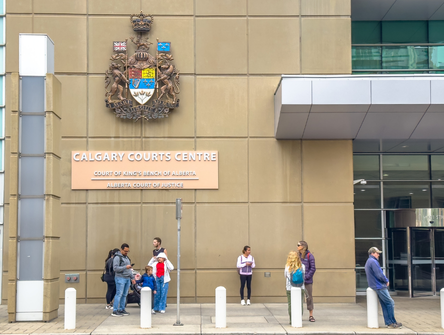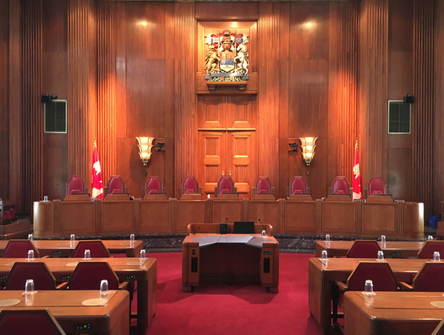Supporting innovation
The Rt. Hon. Beverley McLachlin Access to Justice Fund awarded its first grants towards five different organizations across Canada.

The grants, totalling more than $237,000, are geared towards organizations taking a new approach to access to justice.
"Testing new concepts and sharing knowledge of innovative and practical ideas offers a significant opportunity to advance access to justice across the country," said the former Chief Justice of the Supreme Court of Canada, the Rt. Hon. Beverley McLachlin in a press release. "McLachlin Fund is pleased to support these five initiatives."
The McLachlin Fund's Governing Council reviewed 52 applications and with administrative help from the Law Foundation of British Columbia, five recipients were chosen. Organizations had to demonstrate their project is scalable and can be reproduced in other jurisdictions.
"When we saw the large number of good proposals, this affirmed our belief about how much this fund is needed," said the former Justice of the Supreme Court of Canada Thomas Cromwell who is a council member. "There's a large need for this kind of funding. The strong response to our first call for proposals has redoubled our commitment to see that the Fund is fully endowed at the level of our goal of 10 million dollars. It was always our hope that the Fund would support initiatives that defined the problem, have a solution and test that solution to see that it worked. These are projects that are scaleable and need our assistance to grow to be successful."
Organizations must be registered charities to receive funding. So when the Fund received a proposal from not-for-profits across Canada, the Law Foundation of British Columbia stepped in. The Foundation awarded $100,000 to Cross-Canada Family Justice Transformation Strategy, an alliance comprised of Access to Justice BC, Reforming the Family Justice System in Alberta, the Canadian Institute for the Administration of Justice (CIAJ), Access to Justice and Law Reform Institute of Nova Scotia and CREATE Justice in Saskatchewan.
"A benefit of the Fund is to assist with changing the landscape of funding opportunities for access to justice initiatives" says former judge Bruce Cohen, a member of the Fund's Governing Council. "The Fund provides financial support to proposals that encourage, support and enhance access to justice projects across the country."
Access Pro Bono Society of B.C., which received $60,000 in funding, will launch the Everyday Legal Clinic in May. The clinic aims to "increase access to justice for all British Columbians, regardless of their identity, income and location," says Jamie Maclaren, Executive Director of Access Pro Bono Society of B.C. The public legal interest incubator is focused on training the next generation of lawyers by hiring a diverse group of articling students. So far, five of their 20 articling students are Indigenous, and 10 students are people of colour.
"Dedicated funding for access to justice initiatives is relatively rare," says Maclaren. "Legal service charities like ours must compete for donations and grants with much bigger and better known charities, and for initiatives that many people wrongly assume are supported by government. The McLachlin Fund provides financial support and profile to our project that we can leverage to gain more support from new donors and funders."
Justice for Girls Outreach Society, an advocacy group for teenage girls living in poverty, received a $60,000 grant for its access to justice project examining the barriers facing teenage girls in the justice system. The goal is to create training for lawyers and the judiciary. "There are practical barriers for girls accessing the justice system," says Sue Brown, Director of Legal Advocacy and Policy at Justice for Girls. "For example, finding a lawyer is difficult. You have intersectionality identities with girls that are radicalized or Indigenous living in poverty, so there are even more barriers to remedies. We need people who are trained to give services to this population."
The Canadian Council for Refugees (CCR), which received a $60,000 grant, is looking to bolster its legal assistance in Quebec through the Building Quality Justice Services for Newcomers project. Janet Dench, the Executive Director of CCR, says the goal is to create a framework and templates for NGOs. "We recognize that NGOs vary greatly in their size, funding, services they offer and clientele they serve - we are therefore aiming to ensure that the tools we develop will be adaptable to the specific realities of diverse NGOs."
Two universities, the University of Saskatchewan College of Law and the Peter A. Allard School of Law at the University of British Columbia, each received funding to expand programming. CREATE Justice at the College of Law and its partner, the Ministry of Justice, received more than $32,000 for research on the best way to deliver online legal information, particularly to newcomers to Saskatchewan. The project will build on existing work from provincial and national public legal education programs.
"What's particularly exciting about the project is its focus on applying data and the experiences of real people to improve access to justice for the people of Saskatchewan," said Brea Lowenberger, Access to Justice Coordinator and Director of CREATE Justice.
The Peter A. Allard School of Law will use its $25,000 grant for evaluating access to environmental justice. Researchers will look at whether environmental assessment regulation in B.C. has improved the public's access to decision-making. "We maybe don't always think about environmental injustice or regulators as part of the access to justice crisis," says Dr. Jocelyn Stacey, associate professor at the Peter A. Allard School of Law. "This project will highlight the linkages between the environmental challenges faced by marginalized communities and broader A2J concerns.
There will be another round of grant recipients announced sometime in the fall. In the meantime, The McLachlin Fund continues to work to reach its fundraising goal. So far, $7 million of the $10 million goal has been raised.


